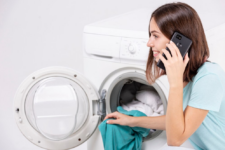
Dealing with Washing Machine Leaks: Causes and Fixes
A washing machine is a vital appliance found in every home, making maintaining our clothing’s cleanliness and freshness much easier. Nevertheless, like other household appliances, washing machines are susceptible to malfunctions, with leaks being one of the most prevalent issues. A leaking washing machine can lead to various problems, including water damage to your home and potential electrical hazards. This detailed guide will delve into the reasons behind washing machine leaks and offer practical solutions to rectify these issues. If you face a persistent leak or any other washing machine problem, it’s crucial to seek professional assistance. Visit https://fixappliances.ca/panasonic-appliance-repair/, a trusted repair service that specializes in fixing washing machine issues, to ensure a prompt and reliable solution.
Common Causes of Washing Machine Leaks
Understanding the reasons behind washing machine leaks is the first step in resolving the issue. Several factors can contribute to leaks, and identifying the root cause is essential for effective troubleshooting. The following are some common causes of washing machine leaks:
- Faulty Door Seals: The rubber door gasket or seal may wear out over time, leading to water seepage during the wash cycle.
- Damaged Hoses: Leaks often occur due to cracks or holes in the hoses that connect the washing machine to the water supply.
- Clogged Drain Pump: Accumulated debris or foreign objects in the drain pump can hinder proper water drainage, resulting in leaks.
- Overloaded Machine: Overloading the washing machine can cause excessive vibrations and movement, leading to leaks.
- Loose or Damaged Connections: Inspect the water inlet valve, hoses, and drum for loose or damaged connections.
In conclusion, addressing leaks caused by faulty door seals is essential to maintaining the efficiency of your washing machine. Regularly checking and promptly replacing worn-out seals are essential preventive measures. By maintaining the proper functionality of the door seal, you not only prevent water leakage during the wash cycle but also enhance the overall lifespan of your washing machine. Keep in mind that a proactive approach to the upkeep of this component can shield you from potential water damage and expensive repairs in the long term.
Fixes for Washing Machine Leaks
Once you’ve identified the cause of the washing machine leak, it’s time to implement the necessary fixes. Bear in mind that certain repairs might necessitate professional assistance. Below are practical solutions for addressing common washing machine leaks:
- Replace Door Seals: If the door seal is damaged or worn, replace it with a new one. This step is crucial to prevent water leakage during the wash cycle.
- Inspect and Replace Hoses: Regularly inspect hoses for any signs of damage, and replace them if you find cracks, holes, or other issues.
- Clean the Drain Pump: Eliminate debris or foreign objects from the drain pump to guarantee adequate water drainage. Consult your washing machine’s manual for instructions on accessing and cleaning the pump.
- Balance the Load: Steer clear of overloading the washing machine to prevent excessive vibrations. Maintaining an appropriately balanced load is crucial to avoiding potential issues associated with excessive movement.
- Tighten Connections: Check and tighten any loose connections between the water inlet valve, hoses, and the drum. Replace damaged components as needed.

In summary, damaged hoses are a common culprit behind washing machine leaks, necessitating prompt attention. Frequent inspection of hoses for indications of wear and tear is crucial in preventing leaks. If cracks, holes, or other issues are detected, it is imperative to replace the hoses promptly. By addressing this common cause, you not only mitigate the risk of water damage but also ensure the proper functioning of your washing machine. Keep in mind that proactive maintenance of hoses contributes significantly to the longevity and reliable performance of your appliance.
Preventive Maintenance Tips for a Leak-Free Washing Machine
-
Recommending regular checks for wear and tear:
| Component to Check | Frequency | Action |
| Door Seals | Every 6 months | Inspect for wear, cracks, or damage. |
| Replace worn-out seals promptly. | ||
| Ensure proper alignment of the door. | ||
| Hoses | Every 3 months | Check for visible damage, cracks, or bulges. |
| Replace damaged hoses with high-quality alternatives. | ||
| Ensure secure installation to prevent leaks. | ||
| Connections | Every 4 months | Inspect and tighten connections between components. |
| Replace any damaged or worn-out parts. | ||
| Drain Pump | Every 12 months | Consult the manual for instructions on accessing the pump. |
| Remove debris or foreign objects. | ||
| Clean the pump regularly to ensure proper drainage. |
-
Providing guidelines for maintaining a leak-free washing machine:
- Use the Right Detergent: Ensure you use the appropriate type and amount of recommended detergent for your washing machine. Using excessive detergent can lead to excess suds, potentially causing leaks.
- Inspect Water Inlet Valve: Periodically check the valve for any signs of wear or malfunction. Replace a faulty valve promptly to prevent water leaks during the filling process.
- Level the Machine: Make sure your washing machine is level and properly balanced. Adjust the machine’s feet as needed to eliminate any wobbling or tilting, which can contribute to leaks.
- Clean the Dispenser Drawer: If your washing machine has a detergent dispenser drawer, regularly clean it to prevent clogs and ensure proper detergent distribution. A clean dispenser helps maintain a leak-free operation.
- Monitor Spin Speed: When washing laundry, be mindful of the spin speed settings. Higher spin speeds can lead to increased vibrations and potential leaks. Adjust the spin speed based on the type of laundry being washed.

Implementing these preventive maintenance tips will not only help you avoid potential leaks but also contribute to the overall efficiency and longevity of your washing machine. Regular checks and timely interventions ensure a smooth and trouble-free laundry experience.
Seeking Professional Assistance
While some washing machine leaks can be addressed through DIY fixes, certain issues may require professional intervention. If you encounter persistent leaks or other complex problems, it’s advisable to seek the expertise of a reliable repair service which specializes in diagnosing and repairing washing machine issues, providing prompt and efficient solutions to ensure the optimal performance of your appliance.
Dealing with washing machine leaks requires a systematic approach to identify and address the root causes. By comprehending common issues and applying the proposed solutions, you can safeguard your home from water damage and promote the durability of your washing machine. For more complex problems or persistent leaks, don’t hesitate to contact repair centers for professional assistance. With their expertise, you can trust that your washing machine will be back in optimal condition in no time.



















































































